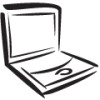Gateway NX100 Gateway Notebook Reference Guide R2 for Windows XP - Page 41
Using an optional port replicator, Installing a printer or other peripheral device
 |
View all Gateway NX100 manuals
Add to My Manuals
Save this manual to your list of manuals |
Page 41 highlights
Using an optional port replicator Using an optional port replicator Although you can attach devices directly to your notebook, a port replicator lets you make all of those connections at one time. When you travel with your notebook, you merely disconnect from the port replicator instead of unplugging all the devices. A port replicator also provides additional ports and other expansion features not included with your notebook. For more information about using a port replicator, see the port replicator user guide. Installing a printer or other peripheral device Important Before you install a printer, scanner, or other peripheral device, see the device documentation and installation instructions. Help and Support For more information about installing peripheral devices, click Start, then click Help and Support. Type the keyword installing devices in the Search box, then click the arrow. Your notebook has one or more of the following ports: IEEE 1394 (also known as Firewire® or i.Link®) and Universal Serial Bus (USB). You use these ports to connect peripheral devices such as printers, scanners, and digital cameras to your notebook. IEEE 1394 and USB ports support plug-and-play and hot swapping, which means that your notebook will usually recognize such a device whenever you plug it into the appropriate port. When you use an IEEE 1394 or USB device for the first time, your notebook will prompt you to install any software the device needs. After doing this, you can disconnect and reconnect the device at any time. 35















